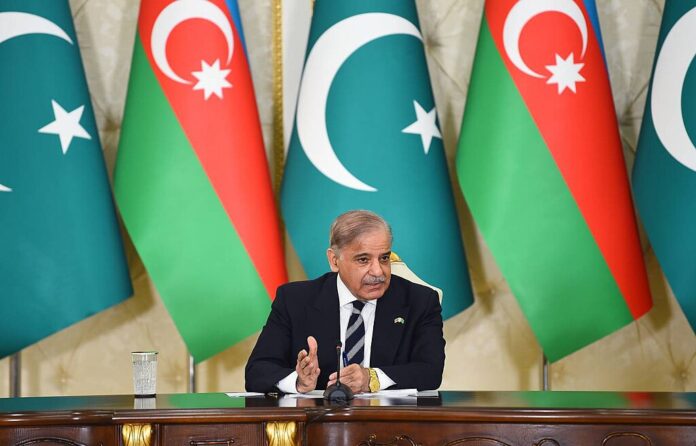Prime Minister Shehbaz Sharif highlights a notable reduction in inflation to 11% and anticipates further improvements, supported by Moody’s credit rating upgrade
Prime Minister Shehbaz Sharif expressed optimism over Pakistan’s recent economic achievements, particularly the substantial decrease in inflation. The Consumer Price Index (CPI) dropped to 11% in July, marking a significant milestone in the country’s economic recovery.
Shehbaz Sharif praised the latest economic indicators, noting that this is the first time in over 33 months that inflation has fallen into single digits. This positive trend is attributed to a slowdown in core inflation, stable utility prices, and reduced fuel costs. According to Taurus Research, the inflation rate for August 2024 is expected to be 9.7%, reflecting a 0.4% decrease from the previous month.
Embed from Getty ImagesIn detail, the housing and utilities category, which makes up 24% of the CPI, is anticipated to decrease by approximately 1.2% from the previous month. The transport sector, accounting for 6% of the index, is projected to drop by 1.1%, driven by a 5% reduction in Motor Spirit (MS) prices and a 6% decrease in High-Speed Diesel (HSD) prices.
While the food segment, which comprises 35% of the CPI, is expected to remain stable, there have been increases in the prices of chicken, eggs, vegetables, and fruits. Taurus Research also highlights potential pressures from other sectors such as health, education, and recreation.
Looking ahead, the report predicts that the National Consumer Price Index (NCPI) will average below 11% for the fiscal year 2025. The State Bank of Pakistan’s Monetary Policy Committee (SBP-MPC) is expected to cut the policy rate by 100 basis points to 18.50% during its upcoming meeting on September 12, 2024. This anticipated rate cut, part of a broader easing strategy, could bring cumulative reductions totalling 350 basis points for the year.
The Prime Minister also emphasized the government’s commitment to ongoing economic reforms, including efforts to relieve electricity consumers and further reduce petroleum product prices. He praised his economic team for their role in steering the economy toward stability and assured the public of the government’s dedication to addressing economic challenges.
Key Figures:
- Prime Minister Shehbaz Sharif: Lauded the reduction in inflation and economic improvements.
- Taurus Research: Provided inflation forecasts and insights into sectoral price changes.
- State Bank of Pakistan: Expected to lower the policy rate in the upcoming meeting.
Analysis:
Political:
PM Shehbaz Sharif’s announcement regarding the drop in inflation serves as a strategic political move to bolster public confidence in his administration. By showcasing economic progress, Sharif aims to reinforce his government’s credibility and effectiveness in managing the economy. The credit rating upgrade from Moody’s further supports this narrative, enhancing the administration’s image and providing a counter-narrative to political opponents who may criticize its economic policies. The anticipated rate cut by the State Bank of Pakistan will also be a significant point of discussion, reflecting the government’s proactive approach to economic management.
Social:
The decline in inflation has immediate implications for Pakistani households, potentially easing financial pressures on daily living costs. As inflation rates fall, the cost of essential goods and services, including housing, utilities, and transportation, is expected to stabilize or decrease, which can positively affect the quality of life for many citizens. However, persistent price increases in food and other sectors may continue to strain household budgets. The government’s efforts to mitigate these pressures through relief measures will be closely scrutinized by the public and media.
Racial:
While the overall economic improvements are beneficial, it is crucial to consider how these changes impact various racial and ethnic communities within Pakistan. Economic policies and inflation rates can have disparate effects on different groups, depending on their socio-economic status. For minority communities and marginalized groups, fluctuations in inflation and economic policies may exacerbate existing inequalities or create new challenges. Ensuring that economic relief measures are inclusive and equitable will be essential for fostering social cohesion and addressing disparities.
Gender:
The reduction in inflation and associated economic improvements can have varied effects on gender dynamics in Pakistan. Women, who often bear a disproportionate share of household economic responsibilities, may experience some relief from lower living costs. However, the impact on employment opportunities, wage equality, and access to essential services will also be important factors to monitor. The government’s economic reforms and policies must address gender-specific challenges to ensure that women benefit equally from the economic progress.
Economic:
The drop in inflation and the anticipated interest rate cut are indicative of a positive shift in Pakistan’s economic outlook. Lower inflation rates can stimulate consumer spending and economic growth, while reduced interest rates may encourage borrowing and investment. The economic reforms implemented by the government, including relief measures for utility bills and reductions in petroleum prices, are designed to further support economic stability and growth. However, ongoing monitoring of inflation trends and sectoral price changes will be crucial for maintaining economic stability and ensuring sustained progress.
